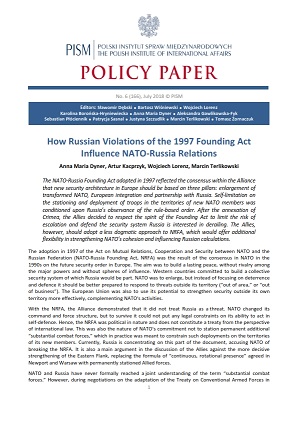№166: How Russian Violations of the 1997 Founding Act Influence NATO-Russia Relations
№166: How Russian Violations of the 1997 Founding Act Influence NATO-Russia Relations
Author(s): Anna Maria Dyner, Artur Kacprzyk, Wojciech Lorenz, Marcin Terlikowski
Subject(s): International Law, International relations/trade, Security and defense, Military policy, Geopolitics, Peace and Conflict Studies
Published by: PISM Polski Instytut Spraw Międzynarodowych
Keywords: NATO; Russian Federation; NATO-Russia Founding Act; NATO-Russia relations; security and defence; cooperation;
Summary/Abstract: The NATO-Russia Founding Act adopted in 1997 reflected the consensus within the Alliance that new security architecture in Europe should be based on three pillars: enlargement of transformed NATO, European integration and partnership with Russia. Self-limitation on the stationing and deployment of troops in the territories of new NATO members was conditioned upon Russia’s observance of the rule-based order. After the annexation of Crimea, the Allies decided to respect the spirit of the Founding Act to limit the risk of escalation and defend the security system Russia is interested in derailing. The Allies, however, should adopt a less dogmatic approach to NRFA, which would offer additional flexibility in strengthening NATO’s cohesion and influencing Russian calculations.
Series: PISM Policy Papers
- Page Count: 8
- Publication Year: 2018
- Language: English
- Content File-PDF

